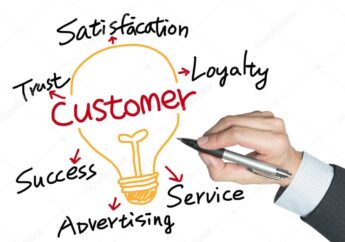Essential Tips For Contact Center Staff Training
by Mony Shah Customer Service Published on: 04 December 2023 Last Updated on: 13 June 2024

In today’s competitive business landscape, equipping contact center staff with the appropriate skills and knowledge is paramount. Top-notch training programs can significantly enhance their performance, thereby promoting customer satisfaction and loyalty. In this article, we delve into several essential aspects you need to consider while setting up a training program in your contact center. Keep reading to find out more.
Understanding The Importance Of Quality Training In Contact Centers

Alt text: A close-up image of a headset with a microphone attached that has been set next to a laptop.
Quality training in contact centers is not a mere formality; it’s an ongoing process. It helps employees stay abreast of the latest industry trends, customer demands, and company policies. It’s the crux of enhancing service quality and boosting customer loyalty.
Structured training in contact centers can instill professionalism in employees. It guides them on how to handle different customer personalities and issue complexities, ensuring high customer service levels at all times.
A well-trained team forms a robust backbone of a successful contact center. They are more confident, competent, empowered, and, in turn, less likely to leave their job, resulting in fewer staffing issues for the company.
Quality training programs are a prime motivator for employees. It makes them feel valued and acknowledged, and paves the way for career advancement, enhancing their job satisfaction and overall performance.
Identifying The Key Skills For Contact Center Staff
When it comes to contact center staff training, it’s imperative to identify the skills required for their job roles. Among the key ones are communication skills, where clarity, listening skills, and empathy play a pivotal role in customer interactions.
Problem-solving skills are crucial, considering the variety of issues that customers may encounter. Staff should be equipped to troubleshoot problems efficiently and rapidly to ensure a smooth customer experience.
Last but not least, stress management skills are essential in a high-pressure environment like a contact center. Resilience and emotional stability can help staff deal with demanding situations while maintaining superior service levels.
Integrating Technology In Contact Center Staff Training
The integration of technology in staff training programs cannot be overstated. It offers innovative ways to teach, learn, and assess, thus making training more engaging and efficient.
Digital platforms permit remote learning, reducing the need for physical presence. This also results in cost savings, makes learning convenient, and allows the training to be more flexible and personalized.
Moreover, technology can collect extensive data about each training session. Analyzing this data can provide insights into the effectiveness of the training, and areas of improvement, and tailor future programs accordingly.
Implementing Continuous Learning For Contact Center Personnel

Alt text: A younger man with glasses on, smiling, on the phone, while sitting in front of his two computers at his work desk.
The dynamics of customer service are constantly evolving. This necessitates continuous learning to keep up with these changes, upskill the staff, and promote their growth within the company.
Continuous learning can be facilitated by implementing a mix of in-house training, workshops, webinars, and e-learning sessions. This ensures the delivery of fresh content, keeps the staff engaged, and caters to their varied learning preferences.
Feedback can serve as a potent tool for continuous learning. Regular feedback sessions help in identifying gaps, working on them, and fostering a culture of improvement. Implementing workforce management (wfm) software provides another avenue to monitor agent performance and gauge training needs. Many wfm solutions are specifically designed for contact center environments.
Measuring Success: Evaluating The Effectiveness Of Contact Center Training
Measuring the success of contact center training is key to determining its effectiveness. It helps track the return on investment, validate the training methods used, and justify the training expenses.
Key Performance Indicators (KPIs) are often used for this purpose, which may include improved customer satisfaction ratings, reduced resolution time, less call abandon rates, among others.
Finally, feedback from the trainees themselves can offer valuable insights into the training program. It helps in understanding what worked, what didn’t, and what could be done differently, serving as a roadmap for future improvements.
Read Also:








































































































All Comments
Trina
Hello, If you are one of the sufferers of the common problems nails have, then you are in luck! Our Toenail Clippers is here to help. It has a specially designed clip that can help those with troubles with winding nails, hard nails, two nails, nail cracks, deep nails, and thickened nails. We are confident that our Toenail Clippers will provide you with the results you are looking for. Get yours today with 60% OFF: Regards, Trina
Layne
Hey there, If you are one of the sufferers of the common problems nails have, then you are in luck! Our Toenail Clippers is here to help. It has a specially designed clip that can help those with troubles with winding nails, hard nails, two nails, nail cracks, deep nails, and thickened nails. We are confident that our Toenail Clippers will provide you with the results you are looking for. Get yours today with 60% OFF: https://podiatristusa.sale Thank You, Layne